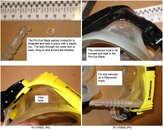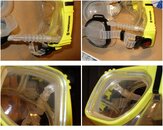To OkByMe,
Glad you made it back to the world. Unbelievable that we are three wars along.
I had scarlet fever when I was six and that caused subsequent ear infections which resulted in the loss of most of my right eardrum. This meant I did not get a SE Asia tour complements of Uncle Sam. I have had two tympanoplasties in the right ear. The second one is still going strong 21years.
I found that when I was diving and getting my ears wet I had trouble with the tympanoplasty. On 2 occasions this resulted in small pinhole leaks. I tried a Doc's Pro Plug and that helped. It will keep your ear dry down to about 20 ft/ 7 m, then limits water exchange. However, the best solution I found was the Pro Ear mask made by IST. The mask has earcups with hoses attached to the eye chamber of the mask. When you equalize your mask, you equalize the earcups and you dive with dry ears. I think that it is easier to equalize dry ears, you don't get a delicate tympanoplasty wet, you don't get outer ear canal irritation and in cold water you blow warm air against your ears.
The mask looks like a dive gimmick, but it works.
Swimming Ear Protection Diving Masks ProEar 2000
Also, how's your air conduction hearing? I now have a BAHA bone conduction hearing aid. It's a bit pricey, but it helps a lot in noisy environments. It's designed for people who have poor air condition of sound through their ear drum, but an otherwise good cochlea.
I have no economic interest in the Pro Ear mask product or the BAHA hearing aid.
---------- Post Merged at 12:16 AM ---------- Previous Post was at 12:12 AM ----------
I meant to site poor air conduction of sound in that last paragraph.






